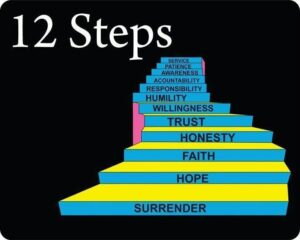How AA Can Help You Find Sobriety and Serenity: The Transformative Power of the 12 Steps
The 12 steps of AA can be a powerful tool in the journey towards recovery, providing guidance, support, and a framework for lasting change. For many individuals struggling with addiction, finding a path to recovery can seem like an insurmountable challenge. Alcoholics Anonymous (AA) has been a beacon of hope, helping for millions worldwide find sobriety and serenity.
1. Admitting Powerlessness and Surrendering:
The first step in the 12-step program is acknowledging powerlessness over addiction. This act of surrender is liberating, as it allows individuals to let go of the illusion of control and open themselves up to the possibility of change.
2. Believing in a Higher Power:
Step two encourages belief in a higher power greater than oneself. This doesn’t necessarily imply a religious affiliation, but rather a recognition that there is a force or source of strength beyond our individual capacities.
3. Turning Your Will and Life Over to the Care of a Higher Power:
Step three involves a conscious decision to entrust your life and well-being to a higher power. This act of surrender lays the groundwork for a transformative journey towards healing.
4. Taking a Moral Inventory:
Step four invites self-reflection and honesty. It encourages individuals to examine their past actions, acknowledging both strengths and weaknesses. This process fosters self-awareness and accountability.
5. Admitting Wrongs and Sharing Them with Another Person:
Step five involves sharing the results of the moral inventory with a trusted person or sponsor. This act of confession and vulnerability is a powerful step towards healing and accountability.
6. Being Ready to Have Your Higher Power Remove Character Defects:
Step six is about being willing to let go of negative character traits that have contributed to addiction. It’s a commitment to personal growth and positive change.
7. Humbly Asking Your Higher Power to Remove Shortcomings:
In step seven, individuals seek divine assistance in overcoming their character flaws. This step emphasizes humility and a willingness to receive help from a higher power.
8. Making a List of Those Harmed and Being Willing to Make Amends:
Step eight involves identifying individuals who were adversely affected by one’s actions. The willingness to make amends demonstrates a sincere commitment to repair relationships and make restitution.
9. Making Direct Amends, Whenever Possible:
Step nine is about taking action to make amends with those who were harmed. This may involve sincere apologies, restitution, or acts of kindness to right past wrongs.
10. Continuing to Take Personal Inventory and Admitting When You’re Wrong:
Step ten encourages ongoing self-reflection and accountability. It emphasizes the importance of promptly admitting mistakes and taking corrective action.
11. Seeking Through Prayer and Meditation to Improve Your Conscious Contact with Your Higher Power:
Step eleven encourages regular spiritual practice, which can include prayer, meditation, or any form of contemplative practice that helps strengthen one’s connection to a higher power.
12. Carrying the Message to Others and Practicing These Principles in All Your Affairs:
The final step involves giving back by helping others on their journey to recovery. It reinforces the idea that sobriety is a collective effort, and that by sharing one’s experiences, strength, and hope, we can inspire positive change in others.

The 12 steps of Alcoholics Anonymous offer a structured and comprehensive framework for individuals seeking recovery from addiction. By embracing these steps with an open heart and a willingness to change, individuals can find a path to sobriety, personal growth, and lasting serenity. Remember, you are not alone in this journey, and there is hope and support available through the fellowship of AA. Together, we can achieve a life of meaningful sobriety and purpose.



